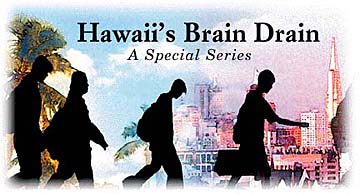


State population
undergoing transformationReturnees buck trend
By Rob Perez
Star-BulletinIt could take four years, perhaps five. But the great demographic shift is coming.
Sometime early in the next decade, the percentage of local residents born outside Hawaii will surpass the percentage of residents born here, according to Jon Matsuoka, a faculty member at the University of Hawaii School of Social Work.
Such a fundamental shift is occurring as Hawaii loses residents -- many of them young, middle- and upper-class people raised here but leaving for mainland educations or jobs -- and gains residents from the mainland and elsewhere. The loss of young talent often is referred to as the brain drain, a phenomenon that has been a concern for years.
If the current pace of population shifts continues, residents born outside Hawaii are expected to outnumber locally born ones by 2003 or 2004, Matsuoka told participants at a recent symposium at the Massachusetts Institute of Technology.
Such a transformation will have significant social, political and cultural implications for Hawaii, Matsuoka said.
While Hawaii often is appealing to outsiders because of its cultural diversity, he said, the migration of residents from elsewhere -- especially the mainland -- and the continuing loss of locally born folks suggests the state will become more culturally homogenous. The trend likely will lead to a dilution of local traditions as well.
"Hawaii is a locale that epitomizes diversity," Matsuoka and two UH colleagues, Cathleen Lum and Sonja Ome, wrote in a May 1998 report on the brain drain phenomenon. "Yet its diversity is at risk by the very ones who are drawn to it from abroad."
The authors said the growing numeric dominance of Caucasians, particularly on the neighbor islands, suggests a wholesale transfer of cultural and living patterns from the mainland.
In the past, mainlanders moved here in smaller numbers and faced greater exposure to local traditions and behaviors, which encouraged acculturation, the three wrote.
But the current rate of Caucasian immigration overwhelms such cultural accommodation, the authors said. And the newcomers often arrive with investment capital and higher socioeconomic status than other residents, which suggests assumption of greater economic and political power.
"Thus the tide of change in Hawaii favors a continental social style," they wrote.